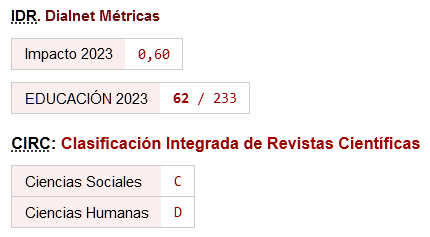The relatıonshıp between perceived spouse support and levels of psychological resilience in married individuals
DOI:
https://doi.org/10.46661/ijeri.7381Keywords:
Perceived spouse support, Psychological resilience, Married individualsAbstract
Psychological resilience is a person's ability to cope with difficulties he/she faces. It is important in terms of being a positive predictor of a person's mental health. Since resilience is associated with social support from the environment, this study aimed to examine the relationship between the support perceived by married individuals from their spouses and their levels of resilience. The Working group consists of 294 married individuals, 73 (24.8%) men and 221 women (72.2%) participating in the research. "Spousal Support Scale," "Short Psychological Resilience Scale," and "Personal Information Form" developed by the researchers to examine socio-demographic characteristics were used to obtain the data. Data were tested with simple linear correlation, simple linear regression, independent sample t-test, and ANOVA test. According to the findings of the study, there is a significant relationship between perceived spousal support and resilience, and spousal support is a significant predictor of resilience. However, while the level of resilience does not differ according to gender, spousal support differs according to gender. While spousal support does not differ according to income level and educational status, psychological resilience differs according to income level but does not differ according to educational status. As a result, the perceived spousal support of married individuals predicts their psychological resilience levels.
Downloads
References
Acitelli, L, K. & Antonucci, T, C. (1994). Gender differences in the link between marital support and satisfaction in older couples. Journal of Personality and Social Psychology, 67(4), 688-698. https://doi.org/10.1037/0022-3514.67.4.688
Akyüz, S. (2016). Kolorektal Kanserlere Bağlı Stoma Açılan ve Açılmayan Hastalarda Psikolojik Dayanıklılık Düzeylerinin Karşılaştırılması [The Comparison of the Resilience Levels of Patients Inwhich The Stoma Is Opened and not Opened The Colorectal Cancers]. Yayınlanmamış Yüksek Lisans Tezi [Unpublished Master’s Thesis]. Ankara Üniversitesi/Sağlık Bilimleri Enstitüsü, Ankara.
Bektaş, M. (2018). Evli Bireylerin Psikolojik Sağlamlık Düzeylerinin Yordanması [Predicting Married Individuals’s Psychological Resilience Levels]. (Yayınlanmamış Doktora Tezi) [Unpublished Doctoral Dissertation]. Dokuz Eylül Üniversitesi/Eğitim Bilimleri Enstitüsü, İzmir.
Boell, J, E, W., Silva, D, M, G, V. ve Hegadoren, K, M. (2016). Socio-demographic factors and health conditions associated with the resilience of people with chronic diseases a cross-sectional study. Revista Latino-Americana de Enfermagem, 1;24:e2786. https://doi.org/10.1590/1518-8345.1205.2786
Campbell-Sills, L, Forde, D, R. & Stein, M, B. (2009). Demographic and childhood environmental predictors of resilience in a community sample. Journal of Psychiatric Research, 43, 1007-1012. https://doi.org/10.1016/j.jpsychires.2009.01.013
Cassel, J. (1974). Psychosocial Processes and “Stress” Theoretical Formulation. International Journal of Health Services, 4(3), 471-482. https://doi.org/10.2190/WF7X-Y1L0-BFKH-9QU2
Cengiz, İ. (2017). Suriyeli Mültecilerde Psikolojik Örselenme, Örselenme Sonrası Gerginlik Bozukluğu, Travma Sonrası Büyüme ve Psikolojik Dayanıklılık [Psychological Trauma, Posttraumatic Stress Disorder, Posttraumatic Growth and Resilience in Syrian Refugees]. Yayınlanmamış Yüksek Lisans Tezi [Unpublished Master’s Thesis]. Yakın Doğu Üniversitesi/Sosyal Bilimler Enstitüsü, Lefkoşa.
Çağ, P. (2011). Evli Bireylerde Eş Desteği ve Evlilik Doyumu [Spouse Support and Marital Satisfaction in Married Couples]. Yayınlanmamış Yüksek Lisans Tezi [Unpublished Master’s Thesis], Hacettepe Üniversitesi/Sosyal Bilimler Fakültesi, Ankara.
Çağ, P. & Yıldırım, İ. (2013). Evlilik Doyumunu Yordayan İlişkisel ve Kişisel Değişkenler [Relational and Personal Predictors of Marital Satisfaction]. Türk Psikolojik Danışma ve Rehberlik Dergisi. Turkish Psychological Counseling and Guidance Journal], 4(39), 13-23. https://www.acarindex.com/dosyalar/makale/acarindex-1423931694.pdf
Dehle, C., Larsen D. & Landers, J, E. (2001) Social Support in Marriage. American Journal of Family Therapy, 29(4), 307-324. https://doi.org/10.1080/01926180126500
Doğan, T. (2015). Kısa Psikolojik Sağlamlık Ölçeği’nin Türkçe uyarlaması: Geçerlik ve güvenirlik çalışması [Adaptation of the Brief Resilience Scale into Turkish: A validity and reliability study]. The Journal of Happiness & Well-Being, 3(1), 93-102. https://www.tayfundogan.net/wp-content/uploads/2016/09/K%C4%B1saPsikolojikSaglamlikOlcegi.pdf
Earvolino-Ramirez, M. (2007). Resilience: A Concept Analysis. Nursing Forum, 42(2), 73-82. doi: 10.1111/j.1744-6198.2007.00070.x
Fernández Batanero, J. M., Román Graván, P., Reyes rebollo, M.M. y Montenegro, M. (2021). Impact of Educational Technology on Teacher Stress and Anxiety: A Literature Review. International Journal of Environmental Research and Public health. 18, 548, https://doi.org/10.3390/ijerph18020548
Fernández Batanero, J. M., Montenegro Rueda, M., Fernández Cerero, J., García Martínez, I. (2020). Digital competences for teacher profesional development. Systematic review. European Journal of Teacher Education. https://doi.org/10.1080/02619768.2020.1827389
Gizir, C, A. (2007). Psikolojik Sağlamlık, Risk Faktörleri ve Koruyucu Faktörler Üzerine Bir Derleme Çalışması [A Literature Review of Studies on Resilience, Risk, and Protective Factors]. Türk Psikolojik Danışma ve Rehberlik Dergisi [Turkish Psychological Counseling and Guidance Journal], 3(28), 113-128. https://dergipark.org.tr/en/pub/tpdrd/issue/21448/229850
Greeff, A, P. & Human, B. (2004) Resilience in Families in Which a Parent has Died, The American Journal of Family Therapy, 32(1): 27-42, https://doi.org/10.1080/01926180490255765
Güngörmüş, K., Okanlı, A. & Kocabeyoğlu, T. (2015). Hemşirelik Öğrencilerinin Psikolojik Dayanıklılıkları ve Etkileyen Faktörler [Factors Influencing Resilience in Nursing Students]. Journal of Psychiatric Nursing, 6(1), 9-14. https://doi.org/10.5505/phd.2015.80299
Günsel, D, A. (2013). Evli Bireylerin Algıladıkları Eş Desteğinin Çeşitli Değişkenler Açısından Değerlendirilmesi: KKTC Örneği [An Assessment of Spousal Support Perceived by Married Persons in Light of Different Variables: The Case of The Turkish Republic of Northern Cyprus]. Yayınlanmamış Yüksek Lisans Tezi [Unpublished Master’s Thesis]. Ankara Üniversitesi/Eğitim Bilimleri Enstitüsü, Ankara.
Herrman, H., Stewart, D, E., Diaz-Granados, N., Berder, E, L., Jackson, B. & Yuen, T. (2011). What Is Resilience?. The Canadian Journal of Psychiatry, 56(5), 258-265. https://doi.org/10.1177/07067437110560050
Işık, Ş. (2016). Türkiye’de Kendini Toparlama Gücü Konusunda Yapılmış Araştırmaların İncelenmesi [Analysis of the Studies in the Field of Resilience Published in Turkey]. Türk Psikolojik Danışma ve Rehberlik Dergisi [Turkish Psychological Counseling and Guidance Journal], 6(45): 65-76. https://docplayer.biz.tr/54661403-Turkiye-de-kendini-toparlama-gucu-konusunda-yapilmis-arastirmalarin-incelenmesi.html
Karabulut, N. & Balcı, A. (2017). Okul Yöneticilerinin Yılmazlık Düzeyi ve Denetim Odağı ile İlişkisi [School Administrators’ Resilience Level and Its Relation with Locus of Control]. Trakya Üniversitesi Eğitim Fakültesi Dergisi [Trakya University Journal of Education], 7(1), 196-214. https://tez.yok.gov.tr/UlusalTezMerkezi/tezDetay.jsp?id=xtlqpDANxZ2_b7cgP_USgg&no=tqNdFdwv9qoc4YpIX_9y5A
Karataş, R. (2016). Özel Eğitim Okullarında Çalışan Öğretmenlerin Psikolojik Dayanıklılık Düzeyleri ve Başa Çıkma Stratejilerinin İncelenmesi [Investigation of Resilience Levels and Coping Strategies of The Teachers Work at Special Education Schools]. Yayınlanmamış Yüksek Lisans Tezi [Unpublished Master’s Thesis]. Hacettepe Üniversitesi, Ankara.
Kaya, M. (2012). The Effectiveness of Social Support Program on Spouse Support and Perceived Parental Support. Humanity&Social Sciences Journal, 7(1), 6-17. doi: 10.5829/idosi.hssj.2012.7.1.1102
Kelle, Ö. & Uysal Irak, D. (2018). Resilience As A Mediator Between Affect, Coping Styles, Support and Life Satisfaction. Life Skills Journals of Psychology, 2(3), 73-86. https://doi.org/10.31461/ybpd.426836
Kerres Malecki, C. & Kilpatrick Demary, M. (2002). Measuring Perceived Social Support: Development of The Child and Adolescent Social Support Scale (CASSS). Psychology in the Schools, 39(1), 1-18. https://doi.org/10.1002/pits.10004
Kılınç, A, Ç. (2013). Examining Psychological Hardiness Levels of Primary School Teachers According to Demographic Variables. Turkish Journal of Education, 3(1), 70-79. https://doi.org/10.19128/turje.181077
Luthar, S, S., Cicchetti, D. & Becker, B. (2000). The Construct of Resilience: A Critical Evaluation and Guidelines for Future Work. Child Development, 71(3): 543-562. https://doi.org/10.1111/1467-8624.00164
Masten, A, S. (2001). Ordinary magic: Resilience processes in development. American Psychologist, 56(3): 227-238. https://doi.org/10.1037/0003-066X.56.3.227
McCubbin, M., Balling, K., Possin, P., Frierdich, S. & Bryne, B. (2002). Family Resiliency in Childhood Cancer. Family Relations, 51(2): 103-111.https://doi.org/10.1111/j.1741-3729.2002.00103.x
Navaie-Waliser, M., Martin, S, L., Tessaro, I., Campbell, M, K. & Cross, A, W. (2000). Social Support and Psychological Functioning Among High-Risk Mothers: The Impact of the Baby Love Maternal Outreach Worker Program. Public Health Nursing, 17(4), 280-291. https://doi.org/10.1046/j.1525-1446.2000.00280.x
Özcan, S, G. (2014). Evli Bireylerin Cinsiyete Göre Aldatma Eğilimleri, Evlilik Doyum Düzeyleri ve Cinsel Doyum Düzeyleri Arasındaki İlişkinin İncelenmesi [The Examination of The Ralationship Between Married Couples Terms of Sex and The Link Between Their Sextual and Marriage Satisfactory Level and Tendency Towards Decepsion]. Yayınlanmamış Yüksek Lisans Tezi [Unpublished Master’s Thesis]. Haliç Üniversitesi/Sosyal Bilimler Enstitüsü, İstanbul.
Ross, C, E. & Mirowsky, J. (2002). Family Relationships, Social Support and Subjective Life Expectancy. Journal of Health and Social Behaviour, 43(4), 469-489. https://doi.org/10.2307/3090238
Smith, B, W, Dalen, J, Wiggins, K, Tooley, E, Christopher, P & Bernand, J. (2008). The brief resilience scale: Assessing the ability to bounce back. International Journal of Behavioral Medicine, 15(3): 194-200. https://doi.org/10.1080/10705500802222972
Tekin, E. (2011). Askeri Hastanelerde Çalışan Hemşirelerin Psikolojik Dayanıklılık ve Tükenmişlik Düzeylerinin Belirlenmesi [To Determine Levels of Psychological Hardiness and Burnout in Nurses Who Work in Military Hospitals]. Yayınlanmamış Yüksek Lisans Tezi [Unpublished Master’s Thesis]. Gazi Üniversitesi/Sağlık Bilimleri Enstitüsü, Ankara.
Terzi, Ş. (2008). Üniversite Ögrencilerinin Psikolojik Dayanıklılıkları ve Algıladıkları Sosyal Destek Arasındaki İlişki [The Relationship Between Psychological Hardiness and Perceived Social Support of University Students]. Türk Psikolojik Danışma ve Rehberlik Dergisi [Turkish Psychological Counseling and Guidance Journal], 3(29), 1-11. https://dergipark.org.tr/en/pub/tpdrd/issue/21449/229847
Tonga, Z. (2014). Üniversite Öğrencilerinin Psikolojik Dayanıklılıklarının Karar Stratejileri ve Durumluk Sürekli Kaygı Düzeylerine Göre İncelenmesi [A Study on The Psychological Resilience of Undergraduate Students with Respect to Their Decision Making Strategies and State Trait Anxiety]. Yayınlanmamış Yüksek Lisans Tezi [Unpublished Master’s Thesis]. Gazi Üniversitesi/Eğitim Bilimleri Enstitüsü, Ankara.
Yağmur, T. & Türkmen, S. N. (2017). Ruhsal Hastalığı Olan Hastalara Bakım Veren Aile Üyelerinde Algılanan Stres ve Psikolojik Dayanıklılık. Celal Bayar Üniversitesi Sağlık Bilimleri Enstitüsü Dergisi [Manisa Celal Bayar University Journal of Institute of Health Science], 4(1), 542-548. https://dergipark.org.tr/tr/pub/cbusbed/issue/28426/303105
Yıldırım, İ. (1997). Algılanan sosyal destek ölçeğinin geliştirilmesi, güvenirliği ve geçerliği. Hacettepe Üniversitesi Eğitim Fakültesi Dergisi, 13(13), 81-87. http://efdergi.hacettepe.edu.tr/yonetim/icerik/makaleler/1180-published.pdf
Yıldırım, İ. (2004). Eş Destek Ölçeğinin Geliştirilmesi [Development of Spouse Support Scale]. Turkish Psychological Counseling and Guidance Journal, 3(22), 19-26. doi: 10.17066/pdrd.95605
Zeytinoğlu, E. (2013). Evli Bireylerin Benlik Saygısı, Kıskançlık Düzeyi, Evlilikteki Çatışmalar ve Evlilik Doyumu Arasındaki İlişkilerin İncelenmesi [The relationships among self- esteem, jealousy, marital conflict and marital satisfaction, in married people]. Yayınlanmamış Yüksek Lisans Tezi [Unpublished Master’s Thesis]. Dokuz Eylül Üniversitesi/Eğitim Bilimleri Enstitüsü, İzmir.
Published
How to Cite
Issue
Section
License
Copyright (c) 2023 Buğracan Acibal, Mehmet Kaya, José María Fernández-Batanero, Nesrin Akinci Çötok

This work is licensed under a Creative Commons Attribution-NonCommercial-NoDerivatives 4.0 International License.











